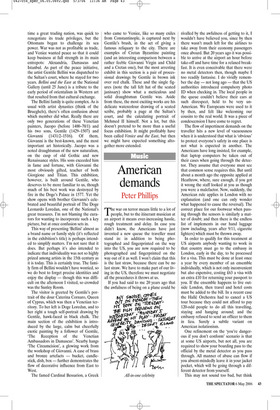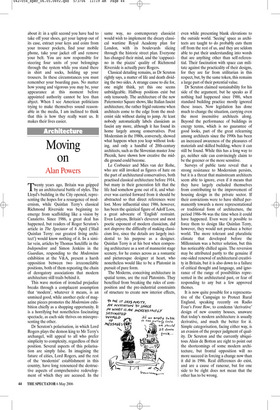American demands
Peter Phillips
The war on terror means little to a lot of people, but to the itinerant musician at an airport it means ever-increasing hassle, rough treatment and delay. In case you didn’t know, the Americans have just invented a new queue the traveller must stand in: in addition to being photographed and fingerprinted on the way into the US, you are now required to be photographed and fingerprinted on the way out of it as well. I won’t claim that this is the last straw, because there can be no last straw. We have to make part of our living in the US, therefore we must negotiate all the procedures it throws at us.
If you had said to me 20 years ago that the awfulness of being on a plane could be rivalled by the awfulness of getting to it, I wouldn’t have believed you, since by then there wasn’t much left for the airlines to take away from their economy passengers once aboard. But 20 years ago it was possible to arrive at the airport an hour before take-off and have time for a relaxed breakfast. It is even conceivable that there were no metal detectors then, though maybe I too readily fantasise. I do vividly remember the day — not long ago — that the US authorities introduced compulsory photo ID when checking in. The local people in the queue couldn’t believe their ears at such disrespect, held to be very unAmerican. We Europeans were used to it by then, and felt like welcoming our cousins to the real world. It was a piece of condescension I have come to regret.
The flow of impertinent demands on the traveller hits a new level of vacuousness when it is understood that what is ‘obvious’ to protect everyone’s safety in one place is not what is expected in another. The Americans have long insisted, for example, that laptop computers be taken out of their cases when going through the detector. They assume that everyone must see that common sense requires this. But until about a month ago the opposite applied at Heathrow, where, sure enough, if you got it wrong the staff looked at you as though you were a malefactor. Now, suddenly, the American rule applies in London with no explanation (and one can only wonder what happened to cause the reversal). The correct place for our footwear when passing through the sensors is similarly a matter of doubt; and then there is the endless list of implements in our hand luggage (now including, years after 9/11, cigarette lighters) which must be thrown away.
In order to qualify for this treatment at US airports anybody wanting to work in that country must go to the embassy in London, early in the day, to be processed for a visa. This must be done at least once a year by every member of an ensemble individually, which is not only inconvenient but also expensive, costing £63 a visa with an extra £10 for returning your passport to you. If the ensemble happens to live outside London, then travel and hotel costs must be added to the bill. In a recent case the Hallé Orchestra had to cancel a US tour because they could not afford to pay 120-odd people to do all this travelling, staying and hanging around; and the embassy refused to send an officer to them in lieu. Surely a subtle variant on American isolationism.
One refinement on the ‘you’re dangerous if you don’t conform’ scenario is that at some US airports, but not all, you are required to show your boarding pass to the official by the metal detector as you pass through. All manner of abuse can flow if you absent-mindedly leave it in your jacket pocket, which will be going through a different detector from yourself.
This may not sound too bad, but think about it: in a split second you have had to take off your shoes, get your laptop out of its case, extract your keys and coins from your trouser pockets, find your mobile phone, take your jacket off and remove your belt. You are now responsible for steering four units of your belongings through the system while you stand there in shirt and socks, holding up your trousers. In these circumstances you must remember your boarding pass. No matter how young and vigorous you may be, your appearance at this moment before appointed authority cannot be less than abject. When I see American politicians trying to make themselves sound reasonable in the media, I am inclined to think that this is how they really want us. It makes their lives easier.















































 Previous page
Previous page